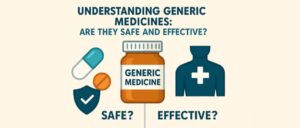Medicines play an important role in managing health conditions and improving quality of life. In this guide, we will cover the uses, benefits, and important details of seven commonly prescribed medicines: Rital 10mg tablets, Ketosteril tablets, Alphagan eye drops, Alp 0.5mg tablets, Eltroxin 100mcg tablets, Methril 10mg tablets, and Kenalog in Orabase.
1. Rital 10mg Tablets
- Uses: Commonly prescribed for Attention Deficit Hyperactivity Disorder (ADHD) and narcolepsy. It helps improve focus, attention, and impulse control.
- How it works: Rital affects chemicals in the brain (dopamine and norepinephrine) that influence hyperactivity and attention.
- Precautions: Not recommended for patients with severe anxiety, heart issues, or uncontrolled high blood pressure.
- Possible side effects: Insomnia, loss of appetite, nervousness, and increased heart rate.
- Uses: Helps in the management of chronic kidney disease (CKD) by preventing protein breakdown and reducing uremic symptoms.
- How it works: Provides essential amino acids and keto analogues that support protein metabolism without burdening the kidneys.
- Precautions: Should be taken under medical supervision, especially with restricted protein diets.
- Possible side effects: High calcium levels, stomach discomfort, nausea.
- Uses: Prescribed for patients with glaucoma or ocular hypertension. Helps reduce intraocular pressure in the eyes.
- How it works: Lowers eye pressure by decreasing fluid production and increasing fluid drainage.
- Precautions: Avoid if allergic to brimonidine or while wearing contact lenses.
- Possible side effects: Eye redness, burning sensation, blurred vision, or dry mouth.
- Uses: Commonly prescribed for anxiety disorders, panic attacks, and insomnia related to anxiety.
- How it works: Belongs to the benzodiazepine group, enhancing the calming effect of GABA (a natural chemical in the brain).
- Precautions: Can cause dependency if used long-term. Avoid alcohol and do not stop suddenly without medical guidance.
- Possible side effects: Drowsiness, dizziness, memory issues, and fatigue.
5. Eltroxin 100mcg Tablets
- Uses: Treats hypothyroidism (an underactive thyroid gland). Helps restore normal thyroid hormone levels.
- How it works: Replaces or provides thyroid hormone, which is important for regulating metabolism, energy, and growth.
- Precautions: Must be taken on an empty stomach, usually in the morning. Dosage should be carefully adjusted by a doctor.
- Possible side effects: Palpitations, weight changes, sweating, and irritability if the dose is too high.
- Uses: Often prescribed for psychiatric and neurological conditions such as schizophrenia and severe anxiety.
- How it works: Works on neurotransmitters in the brain to stabilize mood and reduce symptoms of mental health disorders.
- Precautions: Avoid alcohol, and take only under medical supervision.
- Possible side effects: Drowsiness, dizziness, dry mouth, and changes in blood pressure.
- Uses: Applied inside the mouth to treat oral ulcers, inflammation, and painful sores.
- How it works: A corticosteroid paste that reduces swelling, redness, and discomfort inside the mouth.
- Precautions: Should not be swallowed. Apply a thin layer directly on the affected area as directed.
- Possible side effects: Burning sensation, irritation, or delayed wound healing.
Final Thoughts
These medicines—Rital, Ketosteril, Alphagan, Alp, Eltroxin, Methril, and Kenalog in Orabase are prescribed for very different health conditions, from ADHD and thyroid disorders to kidney disease and oral ulcers. Understanding their uses and precautions helps patients manage their treatment more effectively.





